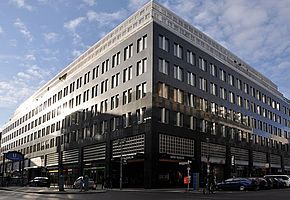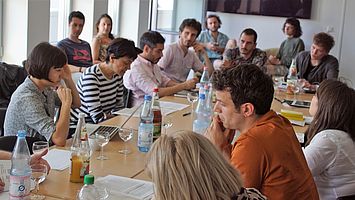The Center
A Franco-German Centre for Social Science Research
Following the fall of the Berlin Wall, the French and German governments jointly decided to establish a Franco-German research centre for social sciences encapsulating Europe in its entirety. Founded on 9 October 1992, the CMB was placed, as of its inauguration on 8 September 1994, under the patronage of the medievalist historian Marc Bloch (1886-1944).
Its first director was the historian Étienne François (1992-1999), followed by the philosopher Catherine Colliot-Thélène (2000-2005); the political scientist Pascale Laborier(2005-2010); the historian Patrice Veit (2010-2015), the historian Catherine Gousseff (2015-2018) and the historian Jakob Vogel (2018-2023). The political scientist Jay Rowell currently holds the position.
Characterized by its bi-national identity and modus operandi, the Centre Marc Bloch has been enhanced since 2015 through the establishment of an association of public utility under German law, a so-called eingetragener Verein, and now bears the name of Centre Marc Bloch e.V. This Verein brings together, inter alia, the Centre Marc Bloch’s French and German funding bodies, thereby establishing a one-of-a-kind institution in the European research arena. Members of this Verein comprise, on one side, ministerial funding bodies - namely the French Ministry of Europe and Foreign Affairs/ Ministère de l'Europe et des Affaires étrangères (MEAE), the French Ministry of Higher Education, Research and Innovation/ Ministère de l'Enseignement supérieur et de la Recherche (MESR) and the German Federal Ministry of Education and Research (BMBF) - as well as research institutions - the Centre national de la recherche scientifique (CNRS), the École des Hautes Études en Sciences Sociales (EHESS) ) and the Wissenschaftskolleg zu Berlin (WiKo). Furthermore, two other institutional partners are involved, namely, the Berlin Senate and the Franco-German University (UFA/DFH), a key player in Franco-German scientific cooperation.
The Marc Bloch Center also remains a joint unit of French research institutes abroad (UMIFRE No. 14 CNRS - MEAE) and a CNRS Service and Research Unit (UAR 3130).
Furthermore, as of March 2011, the CMB enjoys the status of an An-Institut of the Humboldt University of Berlin, which has considerably contributed to its long-term integration in Berlin’s scientific landscape.
As a research and research training institution, the Centre Marc Bloch distinguishes itself through its inter-disciplinarity and its Franco-German dimension. Interdisciplinary practice is at the core of all CMB projects and its four Research Poles that focus on the various fields of study in the Humanities and the social sciences. The Franco-German dimension is a key to the CMB’s scientific practice and approach. This bi-national dimension constitutes the bedrock on which a broader European and international cooperation is being developed, in particular with Central and Eastern Europe and the Mediterranean area.
The Centre Marc Bloch plays a pivotal role between France and Germany, constituting a top-tier relay for networking between universities, laboratories, and researchers from both countries.

